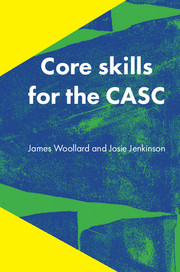6 - Developing the right knowledge
from Part 2 - Planning your preparation
Published online by Cambridge University Press: 01 January 2018
Summary
By the time you get to the CASC you will have sat all three written MRCPsych exams, so your knowledge should have become much deeper. For the CASC, you need to have much more practical knowledge at your fingertips, such as what are the steps to assess testamentary capacity or the therapeutic range for lithium levels.
We would suggest that the knowledge revision specifically for your CASC should start at least 4–6 months before the exam if it is to be done properly. You will need time to feel very secure with your level of knowledge so that you are then able to experiment with how you present in and use practice stations. Here are our top tips for developing your knowledge base.
• A useful start is to make an exhaustive list of the conditions you will need to know about for the CASC. Using the ICD-10 as a guide is useful, but remember there may be conditions which are not in there (e.g. re-feeding syndrome) that can also come up.
• Once you have your list, for each condition you need to know the main symptoms, diagnostic criteria, prognosis and management. To make sense of the management, try writing the different aspects into a 3 × 3 grid, which splits it up into short, medium and long term, and then again into biological, psychological and social areas. This formulation of the management plan will feed into the structure you develop for presenting information in a station, making it much more manageable, concise and complete.
• For every commonly used drug you need to know doses, titrations, sideeffects and contraindications. If the drug requires special monitoring through plasma levels or other blood tests, you need to know these too.
• For every form of therapy you need to understand it enough to be able to explain it.
• Use a variety of sources for your revision (e.g. standard textbooks, evidence reviews, National Institute for Health and Care Excellence (NICE) guidelines, websites, patient information leaflets). We have put together a useful list of resources at the end of the book.
- Type
- Chapter
- Information
- Core Skills for the CASC , pp. 37 - 38Publisher: Royal College of PsychiatristsPrint publication year: 2016



